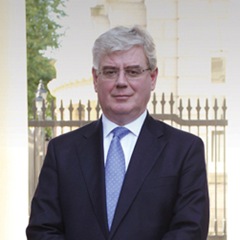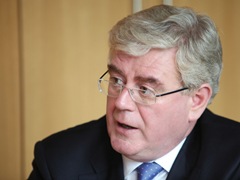Eamon Gilmore interview: aiming for the top
 The possibility of becoming the first Labour Taoiseach is the impetus behind Eamon Gilmore’s burgeoning election preparations. He tells Meadhbh Monahan it’s time the country had a “rest” from Fianna Fáil.
The possibility of becoming the first Labour Taoiseach is the impetus behind Eamon Gilmore’s burgeoning election preparations. He tells Meadhbh Monahan it’s time the country had a “rest” from Fianna Fáil.
Despite Brian Cowen insisting he will see out his full term until May 2012, the Labour Party has put its electioneering wheels in motion. Candidates have been chosen to run in almost all the constituencies in the rural West and the north west, where Labour is traditionally weak.
Gilmore believes that achieving the highest accolade in government looks more likely following his rise in popularity in September’s Irish Times IPSOS MRBI poll and the Millward Brown Lansdowne poll for TV3, where he came out as the most popular leader and Labour was also the most popular party. However the Sunday Business Post Red C tracking poll showed that support for Fine Gael and Labour has fallen (by two and four points respectively), while support for Fianna Fáil remained steady at 24 per cent.
Amid poor ratings on the international markets due to uncertainty over the cost of bailing out Anglo Irish Bank (now estimated to be €50 billion); 450,000 people on the unemployment register; and government spending cuts of €6 billion looming in the Budget on
7 December, people are turning to Labour, according to Gilmore. “It would appear that the increase in support for Labour has been in all areas of the country and in all demographics,” he claims.
Gilmore tells eolas that the economic downturn has made people realise that “buccaneer capitalism” doesn’t work.
The prospect of a Labour-led government for the very first time “will represent very real political change in the state,” Gilmore contends.
Political commentators such as Fintan O’Toole in the Irish Times claim that Gilmore, who was the only party leader to oppose the bank guarantee in 2008, made the right choice then and must make more hard choices now if he is to become Taoiseach.
“That decision, which tied the state so rigidly to the banking system, has been disastrous,” Gilmore states. “We are now seeing the repercussions from that in the high level of borrowing from the state.”
Gilmore has called for a general election and while he has committed to running 65 candidates, he is considering up to 80 names, compared to 50 in 2007. He is fielding more than one candidate in constituencies such as Dublin South Central, Galway East and Limerick City.
His focus is on ‘winning the west’. “If you were to look at the map of the country, in the west with the exception of Galway city and Limerick city, Labour has been weak. That’s now rectified. We will have strong candidates in all constituencies in the west of Ireland and the north west,” Gilmore states. “We have been building up the organisation in those areas. We have appointed an organiser to work, particularly in the north west,” he explains.
In addition, party members carried out a survey of issues facing constituents in the west of Ireland and these will be taken into consideration when formulating the party’s manifesto.
The Galway native has been accused of attacking current policy without outlining alternatives. In response he says he “would do things differently” and explains that job creation is the centre piece of Labour’s economic strategy.
He summarises his well-publicised commitment to creating a strategic investment bank (SIB), mandated to make €20 billion available to Irish business, particularly small and medium-sized enterprises. This bank would be a commercially-focused and independent semi-state company which would be guaranteed during its start-up phase and would be capitalised using €2 billion from the National Pension Reserve Fund. It would lend to SMEs, invest in innovative companies and raise finance for appropriate infrastructure projects. “This, in turn, is a way to get people in construction back to work,” Gilmore argues.
“There are a range of construction projects such as school building and transport projects, all of which would get people in construction back to work, all of which will be difficult given the state of the public finances.”
In addition to the SIB, Labour would have a jobs fund as part of the forthcoming Budget.
“This would be a dedicated fund designed to get people back into employment as quickly as possible,” he explains.
The party also advocates a bank resolution mechanism whereby a bank like Anglo could be dealt with in the same way as a company that goes into administration.
A large contingent of Irish public sector workers are potential Labour voters. With this in mind, Gilmore says he would have transacted the public sector pay bill differently. Instead of a moratorium on recruitment and a pay freeze, Gilmore would have implemented reforms across the public service. “We would do it in a much more targeted way than the Government has done,” he says.
Using Canada’s budget crisis in the 1990s as an example he states that: “they took a very different approach to achieving efficiency in public expenditure. Instead of asking ‘what can we cut’, they began by asking ‘what service do we want to deliver and how do we do it?’ Rather than bring in an outside person to impose cuts, each Minister and department had to take responsibility for the process and to focus on what they wanted to achieve with spending.”
Universal health care is another of Gilmore’s most talked-about policies. “The Labour Party was the first to advocate universal health insurance as the cornerstone of a reformed health system in Ireland,” he remarks. That policy was first released in 2001 and the party is in the process of updating it with a view to publishing a revised policy shortly.
In addition, a Dáil motion on 10th November called for the implementation of 29 reforms, including:
• spending limits for local and Presidential elections;
• rules to ensure that senior public servants (including political appointees) cannot work in the private sector, in an area involving a potential conflict of interest until at least two years have elapsed;
• a 50 per cent increase in Dáil sitting days, a shorter summer recess and significantly reduced breaks at Christmas and Easter;
• an independent Fiscal Advisory Council, separated from decision-makers in government, to undertake fiscal macroeconomic projections and monitoring;
• bringing forward the annual estimates cycle, so that it becomes more timely and relevant, with the Book of Estimates accompanied by a detailed performance report on what the previous year’s spending had achieved; and
• Oireachtas Committees being given powers to publish reports on the economy, efficiency and propriety of the Estimates and to give the Dáil an assessment and evaluation of the merits of individual expenditure proposals.
The Government is in the process of formulating an unprecedented Budget, following from last year’s, where cuts of €4 billion were made.
Labour agreed with the total figure of €3 billion stipulated by the European Commission in the summer. However, the party insists that the €6 billion sum poses an “unacceptable risk to jobs and growth.”
“There is a necessity for people outside the country to understand that as an opposition party, we are committed, if we are in government, to getting our public finances in order,” he claims.
He believes “there should be a balanced mix of measures.” In advance of last year’s Budget, Labour found €900 million in savings by examining the non-pay elements of each department and state agency. In doing this, they gathered information that was publicly available, requested information from the Department of Finance and utilised information that was contained in the McCarthy report.
“We are looking at this list of items again and will be doing another pre-Budget submission,” Gilmore says. In terms of tax reliefs and allowances that are mainly property-related, Gilmore believes €1 billion could be saved.
When asked why he ruled out a coalition between his party and Fianna Fáil after the next general election, even if he were in a position to become Taoiseach, Gilmore responds: “I think we have to be clear about that. The country is looking for change. Fianna Fáil have been in government for over 13 years continuously. In fact, with the exception of the period of the Rainbow Government in the 1990s, they would have been in government for almost a quarter of a century. So, even if there was never an economic crisis, it’s probably in the interests of healthy democracy that the country gets a rest from Fianna Fáil.”
He criticises that party for their handling of the economic crisis and suggests that the Government “is simply serving out its sentence,” adding that what markets respond to positively is “certainty and a new government.”
Europe
Through the Party of European Socialists, Labour retains close links with parties on the continent and Gilmore meets with other party leaders every six months.
One of the reasons why the Labour Party supported the Lisbon Treaty was because it widens the role of national parliaments in making laws, Gilmore explains.
In his view, the Dáil and Seanad have not made adequate arrangements for that.
“Joe Costello, when he was spokesperson on Europe, developed a range of proposals which would increase the role the Dáil, and the Irish public has in the making of European laws so that we see European law, not as something that comes from Brussels but something that we, as citizens of Europe, participate in,” Gilmore states.
He still believes reform is needed and his vision of a Dáil that is more accountable in making EU laws is outlined in the party’s policy document ‘The role of the Oireachtas post-Lisbon’.
In it, the party proposes that all EU documents should be forwarded to the Ceann Comhairle of the Dáil and the Cathaoirleach of the Seanad who should place them to the Oireachtas library, allowing TDs and Senators can engage in EU matters that interest them.
In addition, Europe Day should be the occasion for a week-long debate in the Dáil and Seanad on Ireland’s priorities concerning the EU and the public should be invited to submit ideas prior to the debate. The Joint Committee on European Affairs and the Joint Committee on European Scrutiny should deal with EU matters that come within their remit within a defined period of time, according to the document.
Gilmore is promoting the possibility of change on many levels. If he does take office in Government Buildings he intends to reform the way in which politics is done. “Political institutions need to reform”, Gilmore contends, adding that the way the Dáil works is “a hangover from the nineteenth century and needs to be reformed and modernised.”
He continues: “We need to bring our sitting arrangements up to date with shorter recesses in particular. It is simply no longer acceptable for the Government to close down the Dáil for twelve weeks during the summer, a period during which the opposition are denied the opportunity to hold the Government to account.
In addition, he would ensure that ministers are made fully accountable to the Dáil and are no longer allowed to “hide behind quangos.”
He says that “about two thirds of all parliamentary questions tabled to the Minister for Health are now simply referred on to the HSE for answer by letter, which in some cases can take months.”
Gilmore’s advice to those considering a life in politics is that “now is the time [because] there is a challenge.” He adds that while there is a lot of criticism of politicians and politics “when you think of the alternatives to democracy, it’s incumbent on all of us who are in politics, and individual citizens to make sure that we make politics work, make it more responsible.”







